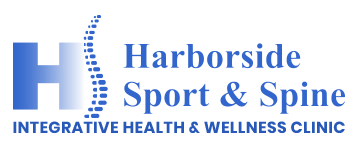Ear Infections Treatment Doctor in Jersey City, NJ
Ear infections are a common condition that can affect individuals of all ages, often causing discomfort, pain, and temporary hearing loss. They occur when bacteria or viruses lead to inflammation and fluid buildup in the ear, typically in the middle ear. Early detection and appropriate treatment are essential to alleviate symptoms, prevent complications, and protect long-term ear health. Come meet our team at Harborside Sport & Spine. We can help you heal better. For more information, contact us or schedule an appointment online. We are conveniently located at 75 Montgomery Street, Suite 603 Jersey City, NJ 07302.


Table of Contents:
What are the common symptoms of ear infections?
Can ear infections cause hearing loss?
When should I see a doctor for an ear infection?
Can ear infections affect both ears?
How can Dr. David Sylvester, DC at Harborside Sport & Spine, help relieve recurring ear infections?
At Harborside Sport & Spine, we understand that maintaining comprehensive health is crucial for peak athletic performance and spine health. While our primary focus is on sports medicine and spinal care, it’s important not to overlook other aspects of health, such as ear health, which can significantly impact your overall well-being and performance.
Ear infections, or otitis media, are common and can affect individuals of all ages, including athletes. These infections occur in the middle ear, the cavity behind the eardrum, and are often caused by bacteria or viruses. Recognizing and addressing ear infections is vital, as they can impede your ability to perform at your best.
Key Symptoms to Watch For:
● Ear Pain and Discomfort: Ear pain can be particularly troubling when engaging in physical activities. The discomfort might be more pronounced when lying down or applying pressure, which can disrupt your training and recovery routines.
● Hearing Loss or Muffled Hearing: Fluid buildup in the middle ear can lead to temporary hearing loss, affecting your balance and spatial awareness—critical components in sports and physical activities.
● Fullness or Pressure in the Ear: Athletes may experience a sense of blockage, impacting concentration and focus during training or competition.
● Additional Symptoms: Difficulty sleeping, fever, headaches, or ear drainage are signs that should not be ignored, as they can affect your energy levels and overall health.
Ear infections can significantly affect hearing, with outcomes varying based on the severity and recurrence of the condition. Below are the key points to understand:
Temporary Hearing Loss
● Fluid Buildup: During an ear infection, fluid often accumulates in the middle ear, hindering sound wave transmission.
● Reversibility: This type of hearing loss is generally temporary and improves as the infection resolves and the fluid drains.
Potential for Permanent Damage
● Chronic or Severe Infections: Repeated infections can weaken or damage the eardrum and middle ear structures.
● Inner Ear Impact: In rare cases, infections may extend to the inner ear, leading to long-term hearing impairment.
Importance of Treatment
● Early Intervention: Seeking prompt medical care can prevent complications, such as chronic infections or structural damage.
● Persistent Symptoms: If hearing loss continues after treatment, an evaluation by a specialist is advised.
Understanding the risks and addressing ear infections early can minimize the chances of hearing loss and ensure better overall ear health.
At Harborside Sport & Spine, we understand that an ear infection can disrupt your daily life, causing pain and discomfort. While some ear infections may resolve without medical intervention, there are times when professional care is necessary to ensure a proper recovery and prevent complications. Here’s when you should consider visiting us for an ear infection:
● Intense Ear Pain: If you’re experiencing persistent and severe ear pain that doesn’t subside within 24 to 48 hours or isn’t relieved by over-the-counter medications, it’s time to consult with a healthcare provider.
● Fever and Chills: A high fever, particularly in young children, or a temperature above 101°F (38.3°C) with accompanying chills may indicate a significant infection that requires medical evaluation.
● Discharge from the Ear: Any drainage of pus or fluid, including clear, yellow, or bloody fluid from the ear, suggests a possible ruptured eardrum or severe infection.
● Hearing Loss or Vertigo: If you experience a sudden or gradual loss of hearing, balance issues, or a persistent sense of fullness in the ear, it’s important to seek specialized treatment. These symptoms can indicate involvement of the middle or inner ear, which our experts can assess.
● Redness or Swelling Around the Ear: Noticeable inflammation, redness, or swelling around the ear area can be signs of an external ear infection.
● Tenderness or Pain Touching the Ear: Pain when touching or pulling on the earlobe or outer ear, especially if combined with other symptoms, should be evaluated to prevent further complications.
● Persistent Symptoms: If your symptoms persist beyond 24 hours or worsen despite home care efforts, a healthcare professional can provide the appropriate intervention and relief.
● Recurring Infections: Frequent or recurrent ear infections warrant a thorough evaluation to identify underlying causes and prevent future occurrences.
Absolutely, ear infections, or otitis media, can indeed affect both ears at the same time, a condition known as bilateral ear infections. While it’s more typical for an infection to occur in just one ear, bilateral ear infections are not rare and can happen when bacteria or viruses spread from one ear to the other.
This can be particularly challenging for those who are active or engage in physical activities, as ear infections can affect balance and overall well-being.
Factors Influencing Bilateral Ear Infections:
● Connected anatomy: The Eustachian tubes, which help drain fluid from the middle ear, are interconnected. An infection in one ear can easily spread to the other, much like how physical stress on one part of the body may affect another.
● Underlying health conditions: Conditions such as colds, allergies, or a weakened immune system can increase the risk of developing ear infections in both ears. Staying active and maintaining a healthy lifestyle, can support a strong immune system.
● Infective agent: Certain bacteria or viruses are more likely to cause bilateral ear infections. Staying informed and taking preventive measures can help reduce this risk.
Symptoms of Bilateral Ear Infections:
● Increased irritability
● Difficulty sleeping
● Tugging or pulling at both ears
● Ear pain on both sides
● Pressure or fullness in the ears
● Difficulty hearing
● Fever
● Fluid drainage from both ears
● Balance issues (in severe cases)
The discomfort and potential hearing issues can be more pronounced with bilateral infections, which is why addressing these symptoms early is crucial for maintaining an active lifestyle.
Proper management of ear infections is crucial to maintaining optimal hearing health. Addressing symptoms early and following a healthcare provider’s recommendations can help prevent complications, such as long-term hearing loss. Seeking evaluation from our specialist ensures accurate diagnosis and appropriate treatment for a healthier auditory system.
While often treated with antibiotics, recurring ear infections may be linked to issues like Eustachian tube dysfunction or spinal misalignment—especially in the upper neck. At Harborside Sport & Spine, Dr. David Sylvester, DC, offers a natural, non-invasive approach to addressing ear infections, particularly for patients seeking alternatives to repeated medication use. Through gentle chiropractic adjustments, Dr. Sylvester works to improve nervous system function and drainage in the ear, helping reduce inflammation and fluid buildup.
This approach is especially beneficial for children and adults with chronic or recurrent infections. At Harborside Sport & Spine, treatment is always personalized to the patient’s age, condition, and health history. Many patients experience fewer infections and improved ear health over time. If you’re looking for a holistic way to manage ear infections and support long-term wellness, Dr. Sylvester provides expert care in a safe, supportive setting. For more information, contact us or schedule an appointment online. We are conveniently located at 75 Montgomery Street, Suite 603 Jersey City, NJ 07302. We serve patients from Jersey City NJ, Hoboken NJ, Weehawken NJ, West New York NJ, Guttenberg NJ, Secaucus NJ, Harrison NJ, Kearny NJ, Newark NJ, Belleville NJ, Lyndhurst NJ, East Orange NJ, and Elizabeth NJ.
Check Out Our 5 Star Reviews


Chiropractic and Physical Therapy Services
▸ Chiropractic
▸ Physical Therapy
▸ Massage Therapy
▸ Acupuncture
▸ Spinal Decompression
▸ Prenatal Chiropractor
▸ Ear Infections
▸ Foot Pain
▸ Headaches
▸ Scoliosis
▸ Slipped Disc
▸ Sprained Ankles
▸ Stress
▸ Frozen Shoulder
▸ Osteoporosis
▸ Shoulder Pain






